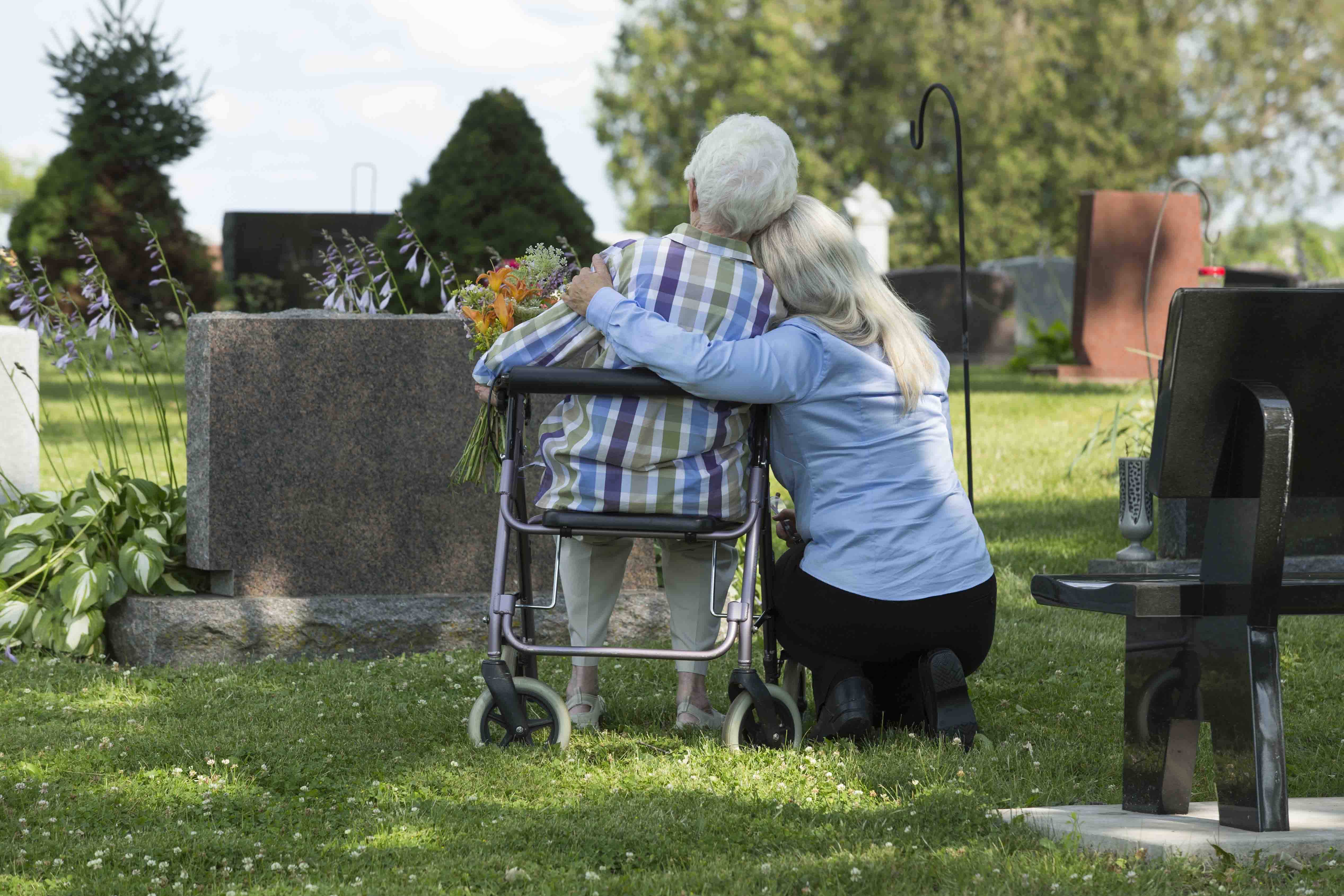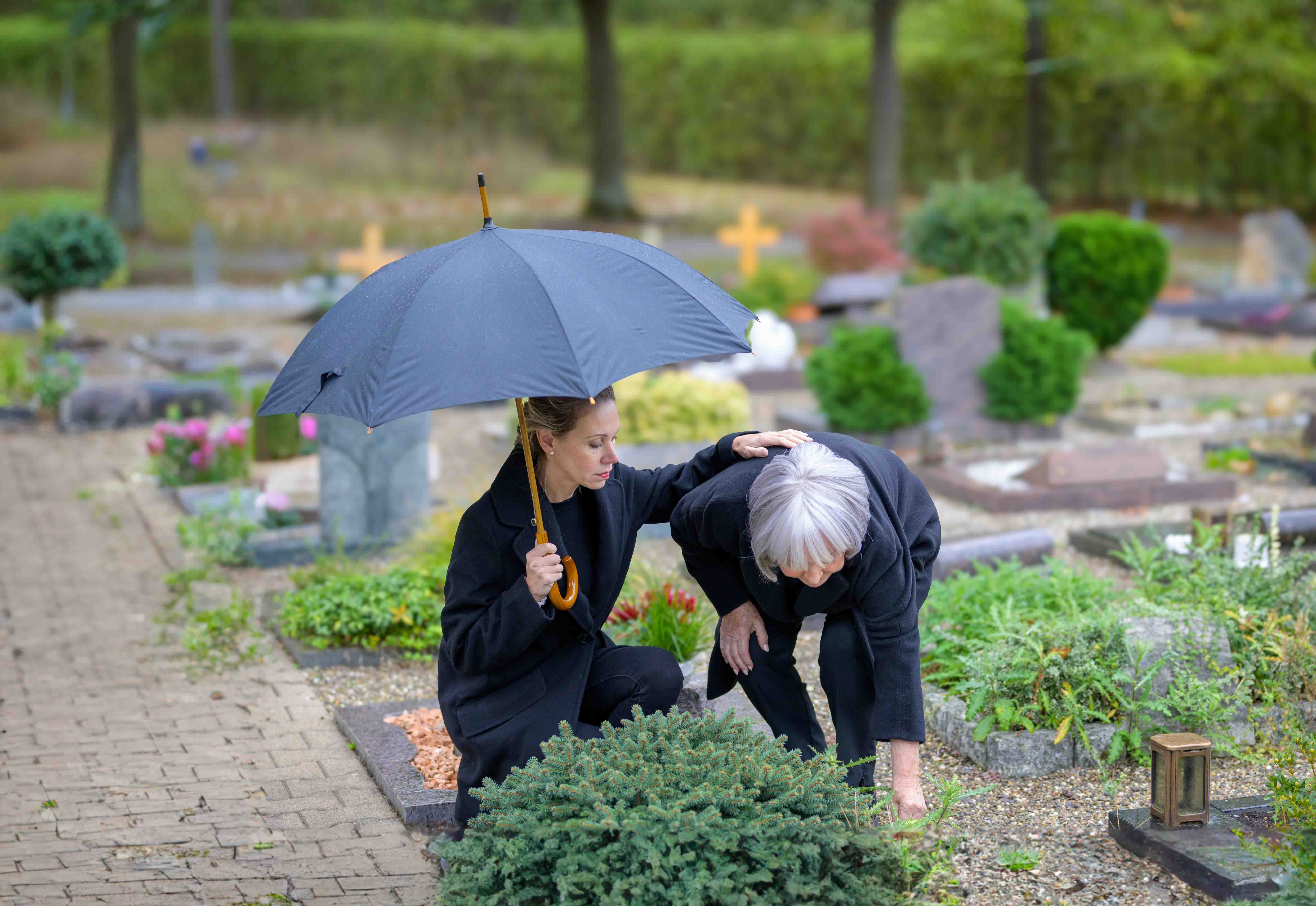The Particular Loss in a Close Friend's Death
The older you are, the more likely you are to lose close friends and face what some refer to as "disenfranchised grief."

Profit and prosper with the best of Kiplinger's advice on investing, taxes, retirement, personal finance and much more. Delivered daily. Enter your email in the box and click Sign Me Up.
You are now subscribed
Your newsletter sign-up was successful
Want to add more newsletters?

Delivered daily
Kiplinger Today
Profit and prosper with the best of Kiplinger's advice on investing, taxes, retirement, personal finance and much more delivered daily. Smart money moves start here.

Sent five days a week
Kiplinger A Step Ahead
Get practical help to make better financial decisions in your everyday life, from spending to savings on top deals.

Delivered daily
Kiplinger Closing Bell
Get today's biggest financial and investing headlines delivered to your inbox every day the U.S. stock market is open.

Sent twice a week
Kiplinger Adviser Intel
Financial pros across the country share best practices and fresh tactics to preserve and grow your wealth.

Delivered weekly
Kiplinger Tax Tips
Trim your federal and state tax bills with practical tax-planning and tax-cutting strategies.

Sent twice a week
Kiplinger Retirement Tips
Your twice-a-week guide to planning and enjoying a financially secure and richly rewarding retirement

Sent bimonthly.
Kiplinger Adviser Angle
Insights for advisers, wealth managers and other financial professionals.

Sent twice a week
Kiplinger Investing Weekly
Your twice-a-week roundup of promising stocks, funds, companies and industries you should consider, ones you should avoid, and why.

Sent weekly for six weeks
Kiplinger Invest for Retirement
Your step-by-step six-part series on how to invest for retirement, from devising a successful strategy to exactly which investments to choose.
Sheldon Heitner and Stephen Kling met on a school bus in 3rd grade; almost seven decades later, they still had the exceptional kind of friendship where they could communicate in shorthand.
So, when Kling, 71, suffered a cardiac arrest in April while engaging in one of his passions — cycling — Heitner immediately flew from his home in France to New York to be with him. As Kling lay on life support, Heitner played songs on his mandolin for hours as Kling’s family gathered around. When he died, Heitner was bereft.
“I have a lot of close friends, but the difference with my relationship with Stephen is how much didn’t need to be said,” Heitner says. “I could say something no one else understood and he knew what I was talking about. We were very different and we had our fights—if we didn’t, it wouldn’t be real. But it was a very rare thing—what we created was something that was integral to both of us.”
From just $107.88 $24.99 for Kiplinger Personal Finance
Become a smarter, better informed investor. Subscribe from just $107.88 $24.99, plus get up to 4 Special Issues

Sign up for Kiplinger’s Free Newsletters
Profit and prosper with the best of expert advice on investing, taxes, retirement, personal finance and more - straight to your e-mail.
Profit and prosper with the best of expert advice - straight to your e-mail.
The loss of a friend can happen any time, of course, but as people age, it becomes more common. It not only brings its own sorrow but is a constant reminder of our own mortality. It’s like a game of musical chairs, says 91-year-old, Joanne of Los Angeles (who asked that her last name not be used): “I’m still here—and very grateful to be so—but when will it be my turn?” she says.
Too often, however, the death of a friend is viewed by others as less significant than that of a family member. “There’s an unspoken tier system that the relationships that are supposed to be the most important to us—and therefore that will create the onset of the deepest grief when we lose them—are the biological family and romantic relationships,” says Litsa Williams, a clinical social worker and co-founder of the website https://whatsyourgrief.com, which provides online education and support for grief and loss.
‘Minimized’ grief
Reaction to the death of a friend is sometimes referred to as “disenfranchised grief,” which means that “your loss is overlooked, unappreciated or minimized by others,” says Marty Tousley, a certified grief counselor who writes on the website www.griefhealingblog.com.
This can happen particularly when a friend’s family doesn’t know of the relationship or doesn’t seem to understand its depth. At worst, that can mean not being notified of a death or included in a funeral or memorial service. Public policy and religion can exacerbate this feeling of outsideness. Friends aren’t entitled to leave through the Family and Medical Leave Act since they aren’t related by blood, marriage or adoption. Some company bereavement policies include close friends — many don’t. Airlines only offer bereavement fares to family members and don’t include friends on their lists of acceptable grievers.
The Jewish religion, for example, names seven primary mourners—spouse, son, daughter, father, mother, sister and brother — who are provided the space to sit shiva and participate in other rituals. Friends are not included.
That means, Tousley says, that “the bereaved can feel invisible, cast adrift, isolated and alone, not knowing what to do with their grief and deprived of the support that shared grief can bring.”
Friendships run deep
One issue is that the definition of friend is so loose; for some, their friends, even those they call close, live on the outskirts of their lives — someone to have a nice lunch with or go to a concert. For others, friends are part of their very foundation; Aristotle defined a friend as “a single soul dwelling in two bodies.”
The good news is that the importance of friendship—and the depth of loss when friends die—is becoming more widely acknowledged and better understood. The U.S. surgeon general last year warned of an “epidemic of loneliness” and noted that strong social connections are tied to better physical and mental health. Having good friends can create more stable marriages, according to Rhaina Cohen, author of The Other Significant Others: Reimaging Life with Friendship at the Center.
“In the five years since I started working on the book, there’s been so much more robust conversations about friendship,” says Cohen, a producer with National Public Radio in Washington, D.C. “We used to rely on the extended family, but the current ideal is the very isolated nuclear family model and — even for those who achieve it —there’s a lot of dissatisfaction and a sense of being disconnected. There’s a real desire to treat friendship with more seriousness and curiosity and less dismissiveness than we've seen previously.”
And there are more ways than ever to find support for the loss of a friend and suggestions for how to honor and memorialize friends.
A number of books, including recent ones, such as Grief is for People, by Sloane Crosley, about the suicide of her dear colleague and friend and What Our Friends Left Behind: Grief and Laughter in a Pandemic, by Victoria Noe, directly address the issue. Many websites now discuss friend grief, as do podcasts.
Lack of understanding
One consistent theme that emerges is how rare it is for people who have lost a close friend to feel truly seen or understood by others.
In general, in Western culture, people have a hard time acknowledging grief, looking for solutions or “closure” rather than listening to what the bereaved wants — and this is especially true when it comes to the passing of a friend, Williams says.
If others seem to minimize the loss or be unsupportive, it can cause anger, which is “really problematic,” she adds. “Sometimes we need to reassure ourselves that this relationship was as significant as we know that it was even if other people might not see it that way.”
Williams suggests that even if someone unintentionally says something that doesn’t comfort or actually makes things worse, don’t write them off. Try to give feedback about what you want, such as, “I don’t need someone to fix my pain—I need someone to be present with my pain.”
Often those who have lost a close friend find an acknowledgment — through conversation, a card or even an email demonstrating that someone else understands the importance of the friendship and depth of loss—can go a long way.
Suggests Cohen: “Instead of thinking this is ‘just a friend’, and therefore the loss shouldn’t be that significant, entertain the possibility that the fact it is a friend is making the loss that much more difficult and the person might need more support because they don’t feel like they deserve to feel as upset as they are.”
Asking a mourning friend about the deceased and about the nature of the loss instead of just expressing sympathy can be very helpful, she adds.
Four friends, four months
Few have experienced the quick loss of friends suffered by Djamila Fitzgerald, 57, of Cambridge, Mass. Over a four-month period, four good friends died of different and largely unexpected causes. She, fortunately, didn’t feel disenfranchised grief, as her family and friends were very supportive. But what she did feel was overwhelming sadness.
“Those types of friendships—I’ve known one friend since fourth grade — take years to make,” she says. “I definitely feel there's less people that I can just reach out to, check in on, get advice on life. I’m more adrift and it feels like the road is getting harder than before — friends were like handrails or guardrails helping me along. And now it's just more on me to do that on my own.”
Fitzgerald says when people talk about moving on it leaves her cold; what resonated for her was a Ted Talk on grief that emphasized the need to move forward rather than move on.
“I like the idea of moving forward with the person, not moving on. I like to say that I'm still bringing these people with me,” she says. “They still make me feel better about myself. They still shape who I am.”
Fitzgerald and Heitner miss leaning on their lost friends for comfort and advice, but just as much for the phone calls and texting of shared jokes, book recommendations and gossip about friends. And people often falsely assume that it is only those without romantic partners or children who are so heavily invested in friendship.
‘A different bond’

“I’m blessed with a wonderful husband, two great children and sisters, I’m close to, but I can’t imagine a life without friends,“ Fitzgerald says. “Friends come to you willingly — there’s a different bond.”
There are few specific rituals around friend loss, so people often invent their own: Williams, 43, who lost a close friend a few years ago, goes back to the same place they used to have dinner and drinks every month. “I use that as a little time where I feel close to her and my grief,” she says. Others raise money for the disease that took their friend, such as cancer.
Rabbi Jeffrey Sirkman in Larchmont, N.Y, says that although friends are not explicitly included among the seven primary mourners, he and most reform rabbis treat the death of a very close friend as they would a family member.
“People who lose a parent—they’re very sad, but are they forlorn? Mostly not,” he says. “When you lose a friend who’s your peer, who reminds you of your own mortality and also everything that you shared together? It sort of shakes and awakens something in you. And I think the natural response is the need to ritualize.”
He also notes that the importance of a study partner — which has the same root in Hebrew as friend—is stressed in the Talmud, the primary source of Jewish law.
Williams suggests using the concept of an ethical will, written by those who wish to pass on values and life lessons to their family after they die, to commemorate a friend who has passed.
Think about the specifics of how this friend shaped and changed you, Williams suggests, and write down what those imprints are and “how am I going to affirm those imprints that I really want to carry forward with me, in a conscious and deliberate way?”
Turning to social media to find support groups where people have experienced a similar loss can be helpful, but if that doesn’t work, give yourself permission to move on, Williams says. “Be open to support in different places. Test different things out. There are lots of great free and affordable support options out there.”
And while mourning a close friend, it’s also important to remember the importance of what can be called “weak ties” or “soft connections”—the barista we greet every day, the neighbor we chat with briefly, Williams adds. Research has shown that these connections, while they may seem insignificant, are actually associated with having more close ties over time and are important in maintaining emotional health, especially as people age.
For Fitzgerald, the death of her friends has brought to mind her grandmother, who lived until she was 97 years old. She had an address book where she crossed out names of friends as they passed, and “At one point her book was more crossed out than not. And I’ve been thinking about that a lot.”
There is no real answer to how to cope with the increasing loss of friends as one ages, says Joanne, the Los Angeles nonagenarian, except with sometimes black humor and gratitude for what one still has.
“It's as though I am living in a world where at night there is a starry sky above, with lots and lots of stars. As I lose friends, a star blinks out with each loss,” she says. “The starry sky remains above but looks sparser and sparser as the number of stars diminishes.”
How to grieve the loss of a friend
Here are some suggestions to help you better cope with the loss of a dear friend:
- Don’t discount the intensity of your sadness because it’s “just a friend.” Friends can be just as, or more, foundational to our lives than as family.
- Social media can offer helpful support groups, but if the advice or discussions don’t feel right, don’t hesitate to move on. Be open to testing different outlets and types of help.
- If you don’t want to interact with others online, there are also many useful books, talks and websites about grief, some of which specifically address the death of a friend.
- Reach out to family members of the friend by visiting, calling or writing. Sharing what the friend meant to you can be therapeutic for you and a gift for the family.
- Find a grief buddy—someone who is also mourning a significant loss—and agree to support each other.
- Sometimes when nothing else helps, a song can soothe, especially when it’s about the loss of a friend. The website What's Your Grief has collected dozens.
Note: This item first appeared in Kiplinger Retirement Report, our popular monthly periodical that covers key concerns of affluent older Americans who are retired or preparing for retirement. Subscribe for retirement advice that’s right on the money.
Related Content
Profit and prosper with the best of Kiplinger's advice on investing, taxes, retirement, personal finance and much more. Delivered daily. Enter your email in the box and click Sign Me Up.
Alina Tugend is a long-time journalist who has worked in Southern California, Rhode Island, Washington, D.C., London and New York. From 2005 to 2015, she wrote the biweekly Shortcuts column for The New York Times business section, which received the Best in Business Award for personal finance by the Society of American Business Editors and Writers. Her work has appeared in numerous publications, including The Times, The Atlantic, O, the Oprah Magazine, Family Circle and Inc. magazine. In 2011, Riverhead published Tugend's first book, Better by Mistake: The Unexpected Benefits of Being Wrong.
-
 Quiz: Do You Know How to Avoid the "Medigap Trap?"
Quiz: Do You Know How to Avoid the "Medigap Trap?"Quiz Test your basic knowledge of the "Medigap Trap" in our quick quiz.
-
 5 Top Tax-Efficient Mutual Funds for Smarter Investing
5 Top Tax-Efficient Mutual Funds for Smarter InvestingMutual funds are many things, but "tax-friendly" usually isn't one of them. These are the exceptions.
-
 AI Sparks Existential Crisis for Software Stocks
AI Sparks Existential Crisis for Software StocksThe Kiplinger Letter Fears that SaaS subscription software could be rendered obsolete by artificial intelligence make investors jittery.
-
 It's Time to Rethink What 'Aging Well' Means
It's Time to Rethink What 'Aging Well' MeansDon’t fall into the trap of thinking there is a "right way" to age. Here's how to reframe aging in a healthy, achievable way.
-
 The New Rules of Retirement
The New Rules of RetirementPopular guidelines about how to save, invest and spend need to be updated and personalized to ensure you'll never run out of money.
-
 I’ve Played 1,300-plus Golf Courses: These Are the 4 on My 'Must-Play' List for 2026
I’ve Played 1,300-plus Golf Courses: These Are the 4 on My 'Must-Play' List for 2026These four luxury golf courses offer an extraordinary experience for players this year.
-
 What to Do If You Plan to Make Catch-Up Contributions in 2026
What to Do If You Plan to Make Catch-Up Contributions in 2026Under new rules, you may lose an up-front deduction but gain tax-free income once you retire.
-
 You Saved for Retirement: 4 Pressing FAQs Now
You Saved for Retirement: 4 Pressing FAQs NowSaving for retirement is just one step. Now, you have to figure out how to spend and maintain funds. Here are four frequently asked questions at this stage.
-
 3 Trips to Escape the Winter Doldrums, Including An Epic Cruise
3 Trips to Escape the Winter Doldrums, Including An Epic CruiseThree winter vacation ideas to suit different types of travelers.
-
 What Science Reveals About Money and a Happy Retirement
What Science Reveals About Money and a Happy RetirementWhether you’re still planning or already retired, these research-based insights point the way to your best post-work life.
-
 How to Leave Different Amounts to Adult Children Without Causing a Rift
How to Leave Different Amounts to Adult Children Without Causing a RiftHere’s how to leave different amounts to adult children without causing a family rift.